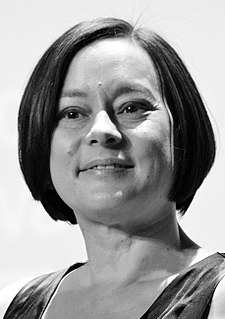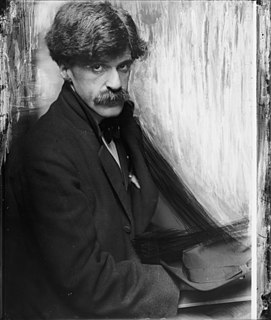A Quote by Maureen Johnson
The cast of Hamlet had not moved much. They had that haunted yet hopeful look in their eyes, like the ones you see in photographs of people crammed into steerage compartments, traveling to some new, unknown land.
Related Quotes
But, finally, I had to open my eyes. I had to stop keeping secrets. The truth, thankfully, is insistent. What I saw then made action necessary. I had to see people for who they were. I had to understand why I made the choices I did. Why I had given them my loyalty. I had to make changed. I had to stop allowing love to be dangerous. I had to learn how to protect myself. But first… I had to look
The reality is that the founding fathers were land speculators. The fact was that you couldn't vote in this country if you did not own land, and that was basically you had to be a white man who owned land. Now how did they get that land? They basically had to steal it from someone, and that would be probably the Indians. And so most of the initial founding fathers were, while they may have had some really nice ideas about democracy, they had a lot of issues with people of color. They had a lot of issues with people who held things that they coveted.
I knew that Vaclav Havel didn't want to look into people's eyes, because he said that, when he was being interrogated during the communist period and had been taken to jail, that, if you look directly into somebody's eyes, they can persuade you. And so you can see that so clearly in this interview, where he's looking down.And I kept saying to him as we kept coming - came over here: " You have to look up."And I clearly had no influence on him.
I had to leave some traces. In the beginning, I would give complete instructions to the photographer. In the '70s, people would come to photograph your work and you would just end up with this crazy material that had nothing to do with your work; maybe I'd pick up two or three photographs that were the closest to the idea. This is why when you look at the '70s, you see much less documentation and really bad material. The material will become misleading to what the piece was.
The myth of the dead Indian goes back to the Protestant settlement of the U.S. The Pilgrims wanted to start a new life in America. They wanted to believe that in some sense they had come to a new Eden and that they could leave history behind in Europe. So they convinced themselves that this land had no history, that this was "virgin" land. This made the Indians' presence inconvenient.
The moment the door opened, Jace seized up a yellow pencil lying on the desk and threw it. It sailed through the air and struck the wall just next to Luke's head, where it stuck, vibrating. Luke's eyes widened. Jace smiled faintly. "Sorry, I didn't realize it was you." ... Luke indicated Simon and Clary with a wave of his hand. "I brought some people to see you." Jace's eyes moved to them. They were as black as if they had been painted on. "Unfortunately," he said, "I only had the one pencil." -Jace & Luke, pg.43-
The reason I do photographs is to help people understand my music, so it's very important that I am the same, emotionally, in the photographs as in the music. Most people's eyes are much better developed than their ears. If they see a certain emotion in the photograph, then they'll understand the music.
If the people of God were to transform the world through fascination, these amazing teachings had to work at the center of these peculiar people. Then we can look into the eyes of a centurion and see not a beast but a child of God, and then walk with that child a couple of miles. Look into the eys of tax collectors as they sue you in court; see their poverty and give them your coat. Look in to the eys of the ones who are hardest for you to like, and see the One you love. For God loves good and bad people.

































